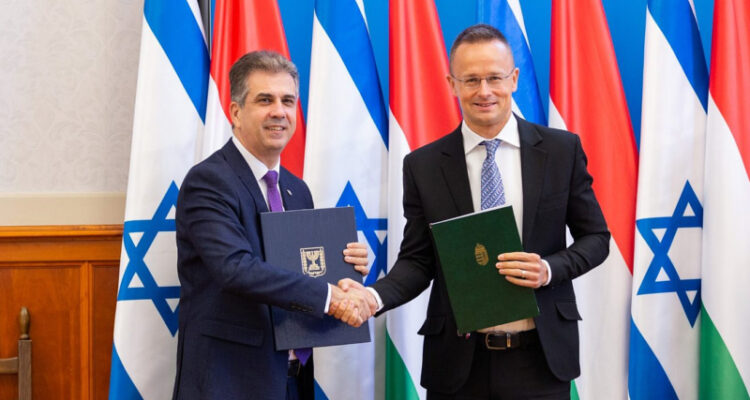Budapest would make the move official “in a number of weeks,” says Israeli Foreign Minister Eli Cohen, while Hungarian ambassador says no final decision has been made.
By JNS
Hungary will become the first European Union member state to open an embassy in Jerusalem, Israeli Foreign Minister Eli Cohen announced in Budapest on Wednesday.
Speaking at a synagogue affiliated with the Chabad movement, Cohen said that Hungary would make the move official “in a number of weeks,” adding that it is “great news for Jerusalem, the capital of the Jewish people for over 3,000 years.”
The central European country has maintained a trade office in Jerusalem since 2019.
Hungary’s ambassador to Israel, Levente Benkö could not confirm Cohen’s claim, saying in a statement Thursday: “Hungary has been operating a trade office in Jerusalem since 2019 and there has been no decision on further steps so far.”
An embassy move would place Budapest in opposition to the official position of the European Union, which does not formally recognize Jerusalem as Israel’s capital.
Paraguay is also poised to return its embassy to Jerusalem following the election of President Santiago Peña, whom Israeli Prime Minister Benjamin Netanyahu congratulated in a telephone call on Tuesday night. Netanyahu commended Peña on his stated intention to return the Paraguayan embassy to Jerusalem immediately following his inauguration in August.
The United States, Guatemala, Kosovo and Honduras currently operate embassies in Jerusalem.
Cohen was in Budapest as part of a four-day, four-country diplomatic swing through central Europe. He first visited Croatia and Slovakia, and is scheduled to head on from Hungary to Austria before returning to Israel.
During his stay in Budapest, Cohen met with his Hungarian counterpart, Péter Szijjárto, who agreed to petition the International Court of Justice in the Hague against the Palestinian Authority’s “pay for slay” policy of providing financial payouts to terrorists and their families.
Israel’s top diplomat said that he had thanked Szijjárto “for his firm stance against the Palestinian Authority’s payments to terrorists who killed Jews,” and that the two had discussed the Iranian threat “and the need to take immediate steps” to halt its nuclear program.
“In addition, we discussed strengthening cooperation in the fields of economy, energy and tourism,” he said.
Cohen also met on Wednesday with President of Hungary, Katalin Novák.
On Tuesday in Bratislava, Cohen became the first Israeli foreign minister to address the Slavkov/Austerlitz format—a regional cooperation forum consisting of Austria, Slovakia and the Czech Republic. He called for unity in countering Iran, warning that its nuclear program was “close to the point of no return.”
Cohen kicked off his Central European trip on Sunday night in Croatia, on Monday meeting in Zagreb with Prime Minister Andrej Plenković and other top officials.




